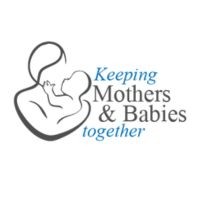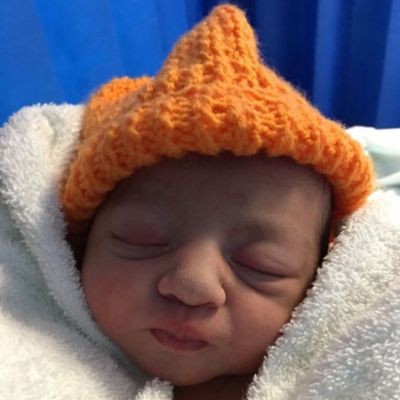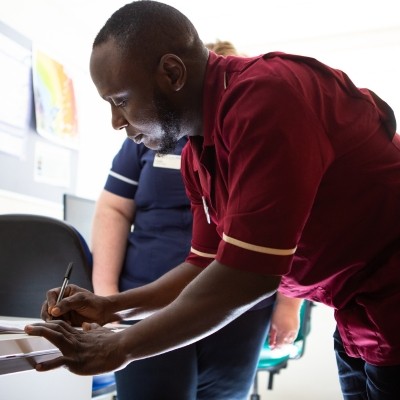
For those who give birth in our consultant-led delivery suites and Heath Birth Centre, postnatal care is normally provided on Victoria ward at Barnet Hospital, on 5 South ward at the Royal Free Hospital, and on the Maternity ward at North Middlesex University Hospital, where a named midwife will look after you each shift, supported by a team of healthcare professionals.
Our wards have a combination of shared bays and single rooms with ensuite facilities.
For those who give birth in Edgware Birth Centre or Barnet Birth Centre or North Mid Birth Centre, as long as no complications arise, your postnatal care will be provided within the birth centre.
Visiting arrangements
One birthing partner or companion can visit anytime, and they can stay overnight with you.
Due to limited space, we cannot offer a bed or linen for partners, but you can use the chair by the bed to rest and bring your own blanket or pillow.
Other visitors may come between 2pm and 8pm (2pm to 7pm at North Mid). Please have no more than two visitors at any time to ensure a peaceful atmosphere for everyone.
Children who are brothers and sisters of the new baby are welcome to visit, although other children are not allowed onto the ward to reduce the risk of infection.
Patient information leaflet
When you are admitted to the postnatal ward, a plan will be made for when you will go home. This can change if you or your baby develop complications.
If you and your baby are well, sometimes you can go home a few hours after your baby has been born. Your length of stay will depend on your individual circumstances.
When you and your baby are ready to go home, your care will be transferred to the community midwives. The midwives will visit you at home, usually for up to 10 days after you have given birth. Health visitors will take over postnatal care after 10 days.
If you live outside the areas covered by our community teams, a community midwife from your local hospital will contact you and provide your postnatal care.
It is important you tell the hospital staff the address you will be staying at when you go home and the correct contact details, so they can arrange for a midwife to come and see you.
Feeding your baby can feel quite overwhelming at first — whether you are breastfeeding, bottle feeding or a combination of both. We are here to guide and support you. There is a lot of evidence to show how beneficial it is to breastfeed your baby, especially in the early weeks.
However, it can take time to get the hang of, and your midwife can support you with this and let you know details of infant feeding groups in your local community. If you have any feeding worries or concerns, the best thing to do is speak to your midwife or health visitor.
Infant feeding team
All our midwives and healthcare assistants are trained in infant feeding and can offer you support and advice when you need it.
We are also accredited by the World Health Organization and UNICEF as part of their Baby Friendly Initiative, which recognises hospitals that enable mothers to make an informed choice about infant feeding and to be supported in that choice.
We also have specialist midwives who can:
- Make a plan with you during pregnancy if you have concerns about feeding your baby or health problems that may make feeding more challenging.
- Help you in the hospital after the birth if you or your baby are having difficulties with feeding that the midwife team on the ward cannot help with.
- Support you in establishing breastfeeding if your baby is in our neonatal unit, even if your baby was not born at one of our hospitals. This includes helping you to express your milk so you can maintain a good milk supply.
- Offer you advice and support after you and your baby have been discharged from hospital either over the phone or in person.
Contact us
Barnet Hospital and Royal Free Hospital
Email: rf-tr.
North Middlesex University Hospital
Email: northmid.
Advice for mothers
To encourage successful breastfeeding, we recommend that you:
- take vitamin D supplements during pregnancy and while you are breastfeeding
- have skin to skin contact with your baby soon as possible after birth and throughout your stay with us
- keep your baby with you so you can get to know each other and so you can feed your baby when he/she wants
- feed your baby whenever he/she seems hungry. This is known as responsive feeding
It is best to give healthy babies breast milk only for the first six months of life and avoid using bottles, dummies or nipple shields while your baby is learning to feed as they can confuse his/her sucking.
UNICEF and the World Health Organization have created a range of helpful videos on breastfeeding as part of the Baby Friendly Initiative. You can also access information on breastfeeding and bottle feeding your baby in different languages on the UNICEF website.
The Breastfeeding network has a useful guide to expressing and storing breast milk and the Global Health Media Project has videos in different languages about how to attach your baby to your breast.
Other useful resources
- NHS: Is my baby getting enough milk?
- NHS: Common breastfeeding problems
- La Leche League
- First Steps Nutrition Trust
Community support groups
- Barnet Breastfeeding Support Service
- Camden Baby Feeding Team
- Enfield Children's Centre
- Hertfordshire Family Centre Service
- Haringey Infant Feeding Peer Support Service
Breastfeeding Friend digital tool
The Breastfeeding Friend, a digital tool from Start for Life, offers practical information and advice on breastfeeding.
It can be enabled on Amazon Alexa, or you can chat via Facebook messenger.
For the first six months, your baby should be in the same room as you when they are asleep. This can reduce the risk of sudden infant death syndrome (SIDS), or cot death, as can breastfeeding and placing your baby to sleep on their back.
Research has also shown that the following increases the risk of SIDS:
- exposure to cigarette smoke
- co-sleeping
- sleeping with your baby on the sofa
- allowing your baby to overheat
SIDS is rare, so please don’t let worrying about it stop you enjoying your baby's first few months.
You can access more information about what you can do to reduce the risk of cot death on The Lullaby Trust’s website.
When babies cry it can be stressful and overwhelming. Help is out there and all you need to do is ask. Find out more on the ICON website.
Videos on safer sleeping for babies
When a baby is sleeping away from home unplanned
It can be difficult to keep to a safer sleep routine when your living arrangements keep changing, you can still take one of the most important steps – always sleep your baby on their back.
Research shows that placing your baby on their back at the beginning of every sleep or nap, day, and night, significantly lowers the risk of sudden infant death syndrome (SIDS).
Babies who normally sleep on their back but sometimes sleep on their front or side are at a greater risk of SIDS. Routine is key. If you must sleep away from home unplanned, the ABCs of safer sleep will help you keep your baby safe:
Always sleep your baby on their back in a clear cot or sleep space.
Newborn and infant physical examination
Within 72 hours of giving birth, you will be offered a top-to-toe physical examination for your baby by a paediatric doctor or midwife.
This will include four specific screening tests to find out whether your baby has a suspected problem with their:
- eyes
- heart
- hips
- testes (boys)
This will enable us to identify any problems which could benefit from early investigation and treatment.
It will be repeated when your baby is between six and eight weeks of age during the routine appointment with the GP.
The health professional will also identify whether your baby is eligible for the BCG immunisation to protect against tuberculosis during this examination.
You will receive the results of the examination straight away and informed if a referral for further assessment is needed. The results will be recorded in your baby’s electronic record and personal child record (‘red book’).
Newborn hearing screening
We provide a newborn hearing screening programme, as early identification of hearing loss is important for baby development.
It is performed by a small soft tipped earpiece being placed in your baby’s ear and soft clicking sounds played.
The screening test takes a few minutes and is simple and painless. It needs to be undertaken when your baby is settled and there is no background noise.
Sometimes, newborn babies can have fluid or a temporary blockage in the ears which can affect the screening response. If this happens a further test will be offered at a later date in the community to complete the screening.
If your baby is unable to have the screening test prior to going home from hospital, or if your baby was born at home, the newborn hearing screening team will contact you to arrange an appointment within a community clinic for your baby to have the hearing screening performed within four weeks of birth.
Newborn blood spot screening
Newborn blood spot screening is offered to all babies born in the UK, to help identify nine rare but potentially serious conditions.
Most babies screened will not have any condition but, for the small numbers who do, the benefits of blood spot screening are enormous as early detection and treatment can lead to improved health outcomes.
On day five following birth, the midwife will prick your baby’s heel using a special device to collect some drops of blood (the blood spot) onto a card. The card is sent to a laboratory for analysis.
You can help make your baby feel relaxed for the screening by making sure they are warm and comfortable, and by cuddling and feeding them.
You will receive a letter with the results by post usually within six weeks of the blood spot being taken. You will be contacted sooner if there is a suspected condition.
Watch this NHS video about screening tests for you and your baby.
Some babies need extra monitoring and support after birth. 
As part of the 'Keeping Mothers & Babies together' initiative, we came up with the idea of providing knitted orange hats for our more vulnerable babies. Please note, due to infection control processes we are can only accept orange hats as knitted donations. Please contact the maternity unit to enquire about the need for orange hats.
The orange hat helps the team easily identify which babies need extra care, allowing them to take timely observations, blood sugar tests and give extra support to establish feeding so mothers and babies can stay together.
This initiative has proved so successful that we now need more volunteers to help us knit hats for our newborns.
If you have some spare time and orange wool handy, please support this worthy cause by knitting hats for us.
Knitting pattern
- Use double knitting wool.
- Using 3.1/4mm (10) needles, cast on 71 stitches and work 8cm (3in) in rib finishing on 2nd row.
- Change to 4mm (8) needles and work 12 rows in stocking stitch.
- Shape crown.
- 1st row K1*sl.1, K1, p.s.s.o. knit five repeat from * to end.
- 2nd row and every alternate row, purl.
- 3rd row K1*sl.1, K1, p.s.s.o. knit four repeat from * to end.
- 5th row K1*sl.1, K1, p.s.s.o. knit three repeat from * to end.
- 7th row K1*sl.1, K1, p.s.s.o. knit two repeat from * to end.
- 9th row K1*sl.1, K1, p.s.s.o. knit one repeat from * to end.
- 11th row K1*sl.1, K1, p.s.s.o. repeat to the end.
- Break off wool and thread wool through stitches, draw up tight and fasten off.
- Sew hat up, folding rib in half.
You can use WI premier acrylic yarn orange lot no. 2038 from craft and haberdashery shops.
The colour may vary from batch to batch, but as long as its bright orange, it is fine.
Please send in your creations to Royal Free Hospital or Barnet Hospital delivery suites.
If you are on X, follow @MumBaby2gether and share your creations online.

Who can be referred?
We see babies up to 8 weeks old
- Who are noted to have a tongue tie on examination
- Are having difficulty feeding (latching to the bottle or breast)
- Have already had breastfeeding support from a midwife/maternity support worker.
Babies who meet these criteria can be referred to the tongue tie clinic at the Royal Free Hospital.
Your midwife or health visitor will complete the relevant referral form; you will then be contacted by phone to arrange an appointment in the baby tongue tie clinic, which takes place in children’s outpatients at the Royal Free Hospital.
 Translate
Translate

